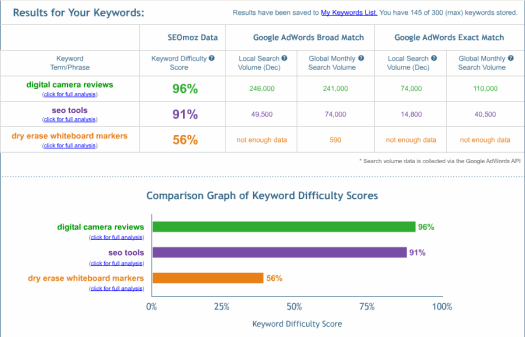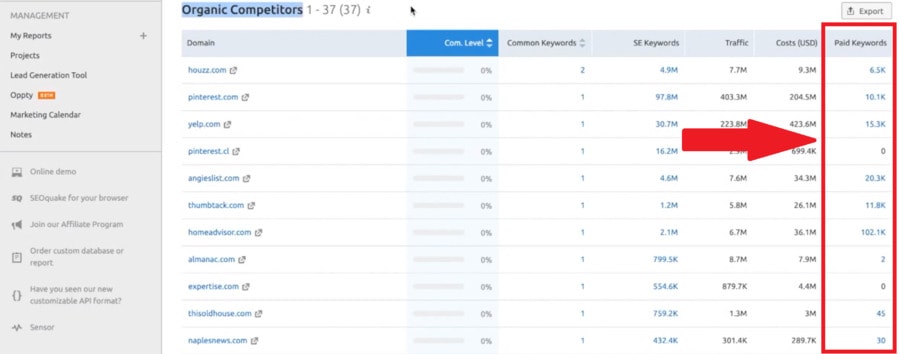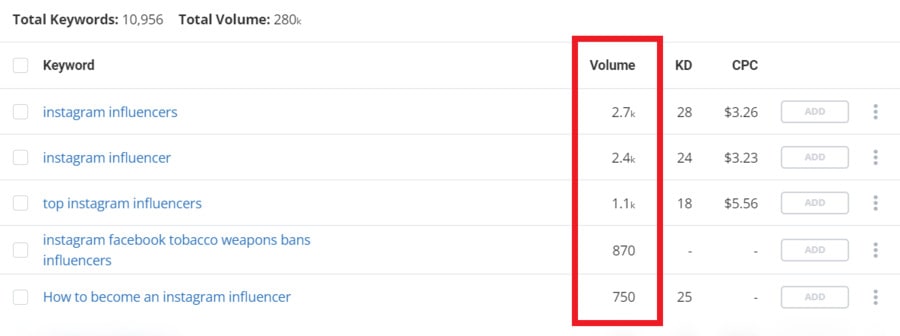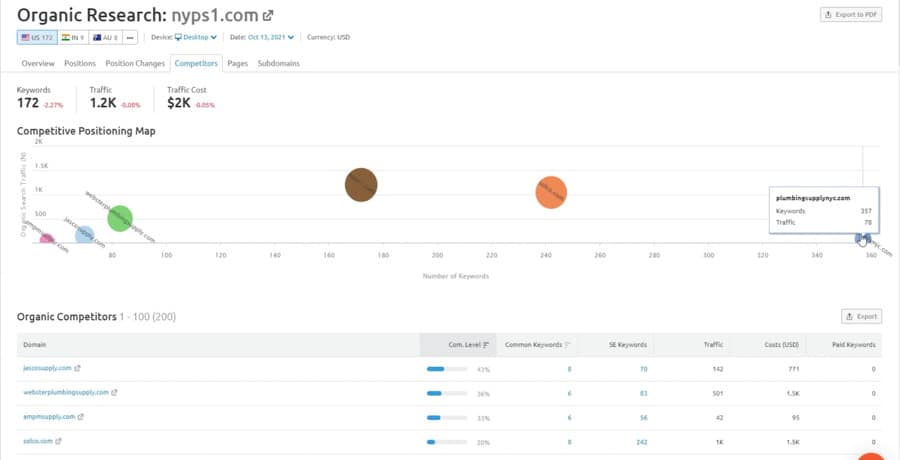Digital Marketing
What is Competitor Keyword Analysis

What is Competitor Keyword Analysis
In the ever-evolving world of digital marketing, understanding your competitors’ strategies and staying one step ahead becomes crucial. This is where Competitor Keyword Analysis comes into play. By conducting a thorough analysis of your competitors’ keywords, you gain valuable insights into their target audience, content strategies, and SEO techniques. This ultimate guide aims to provide you with a comprehensive understanding of Competitor Keyword Analysis, its benefits, and the tools available to aid you in this process. So, buckle up and get ready to unlock the secrets to outranking your competition and maximizing your online visibility.
Understanding Competitor Keyword Analysis
Competitor keyword analysis is a crucial aspect of any successful digital marketing strategy. It involves researching and analyzing the keywords that your competitors are targeting in their online content. By understanding the keywords they are ranking for and optimizing your own content accordingly, you can gain a competitive advantage in the search engine rankings.
Why is Competitor Keyword Analysis Important?
Competitor keyword analysis provides valuable insights into the online landscape of your industry. It allows you to identify the keywords your competitors are targeting and how well they are ranking for those keywords. This information can help you make informed decisions about your own keyword targeting and content strategy.
By understanding your competitors’ keyword strategies, you can uncover untapped opportunities, gain insights into your target audience, and improve your own search engine optimization (SEO) efforts. It also helps you stay ahead of the competition by identifying their strengths and weaknesses, allowing you to differentiate yourself and outperform them in the organic search rankings.

Benefits of Competitor Keyword Analysis
There are several benefits to conducting competitor keyword analysis:
- Improved keyword targeting: By analyzing your competitors’ keyword strategies, you can identify high-performing keywords and incorporate them into your own content. This helps improve the relevance and visibility of your website in search engine results.
- Enhanced content strategy: Competitor keyword analysis can give you a better understanding of the type of content that resonates with your target audience. You can use this information to tailor your content strategy and create more engaging and valuable content.
- Identification of untapped keyword opportunities: By analyzing your competitors’ keyword gaps, you can identify keywords they are not targeting but have potential traffic and conversion value. This allows you to focus on these untapped keywords and attract a unique audience to your website.
- Insights into competitor strengths and weaknesses: Competitor keyword analysis helps you gain insights into your competitors’ SEO strategies, including their ranking positions, organic traffic, and backlink profiles. This information allows you to identify areas where you can outperform them and gain a competitive advantage.
Getting Started with Competitor Keyword Analysis
To get started with competitor keyword analysis, follow these steps:
Identify Your Competitors
Begin by identifying your main competitors in the online space. These are the businesses or websites that offer similar products or services to yours and target the same audience. Make a list of your top competitors and prioritize them based on their relevance and visibility in search engine results.
Select the Right Tools
To conduct effective competitor keyword analysis, you need to leverage the right tools. There are several tools available that can help you uncover competitor keywords, analyze their rankings, and evaluate their backlink profiles. Some popular tools for competitor keyword analysis include Google Keyword Planner, SEMrush, Ahrefs, Moz, and SpyFu. Choose the tools that best suit your needs and budget.
Set Clear Goals and Objectives
Before diving into competitor keyword analysis, it is essential to set clear goals and objectives. Identify what you want to achieve through this analysis, such as improving your keyword targeting, identifying content gaps, or outperforming specific competitors. Having clear goals will help you stay focused and make the most out of your competitor keyword analysis efforts.
Tools for Competitor Keyword Analysis
Several tools can assist you in conducting competitor keyword analysis. Here are some of the most popular ones:
Google Keyword Planner
Google Keyword Planner is a powerful tool for keyword research and analysis. It allows you to discover new keywords, analyze search volume and competition, and get keyword suggestions based on your business or website. While it primarily focuses on keyword research, it can also help you identify competitor keywords by analyzing their content and bidding strategy.
SEMrush
SEMrush is a comprehensive SEO tool that provides valuable insights into competitor keywords, rankings, and backlink profiles. With SEMrush, you can analyze your competitors’ organic and paid keywords, identify the keywords they rank for, and explore the related organic and paid search results. It also offers features for backlink analysis, content analysis, and site auditing.
Ahrefs
Ahrefs is another robust tool for competitor keyword analysis. It allows you to analyze your competitors’ organic search traffic, backlink profiles, and content strategy. With Ahrefs, you can identify your competitors’ top-ranking keywords, analyze their backlink profiles, and uncover content gaps that you can fill with your own strategic content.
Moz
Moz is a popular tool suite that offers a range of features for competitor keyword analysis. It provides insights into competitor rankings, backlink profiles, and on-page optimization. Moz’s Keyword Explorer allows you to discover new keyword opportunities, analyze keyword metrics, and compare your website’s performance against your competitors.
SpyFu
SpyFu specializes in competitor keyword analysis, giving you a deep understanding of your competitors’ SEO strategies. It allows you to analyze your competitors’ organic and paid keywords, track their rankings, and identify the keywords they are bidding on. SpyFu also provides insights into your competitors’ ad copy and ad history, helping you make better decisions for your own advertising campaigns.
Step-by-Step Guide to Competitor Keyword Analysis
Now let’s dive into a step-by-step guide to conducting competitor keyword analysis:
Identify Competitor’s Target Keywords
Start by identifying your competitors’ target keywords. Use the tools mentioned earlier, such as SEMrush or Ahrefs, to analyze your competitors’ organic and paid keywords. Look for keywords that are relevant to your business and have a high search volume. These are the keywords you want to prioritize and target in your own content.
Analyze Competitor’s Ranking
Once you have identified your competitors’ target keywords, analyze their rankings for those keywords. Look for patterns and trends in their rankings. Are there specific keywords where they consistently outrank you? Are there opportunities for you to outperform them in certain keyword categories? This analysis will help you identify your competitors’ strengths and weaknesses and inform your own SEO strategy.
Analyze Competitor’s Organic Traffic
Next, analyze your competitors’ organic traffic. Tools like SEMrush or Ahrefs can provide insights into the amount of organic traffic your competitors are receiving, as well as the keywords driving that traffic. Look for keywords that are driving significant traffic to your competitors’ websites but are not being effectively targeted by your own content. These are opportunities for you to improve your keyword targeting and attract more organic traffic.
Analyze Competitor’s Backlink Profile
A competitor’s backlink profile is another important aspect to analyze in keyword analysis. Analyze your competitors’ backlink profiles and identify the websites that are linking to their content. Look for opportunities to acquire similar high-quality backlinks for your own website. While it may not be possible to replicate all their backlinks, this analysis will help you understand their link building strategy and find potential opportunities for your own backlink acquisition.
Identify Competitor’s Content Strategy
Lastly, analyze your competitors’ content strategy. Look at the type of content they are creating, the topics they are covering, and the keywords they are targeting within their content. This analysis will help you identify content gaps that you can fill with your own strategic content. Consider creating content that is more comprehensive, valuable, and optimized for the keywords that your competitors may be missing.

Strategies for Outperforming Competitors
Competitor keyword analysis is not just about understanding your competitors’ strategies; it’s about using that information to outperform them. Here are some strategies to help you gain a competitive edge:
Identify and Target Untapped Keywords
One of the most effective ways to outperform your competitors is to identify and target untapped keywords. These are keywords that your competitors may not be targeting but have potential traffic and conversion value. Use keyword research tools to identify keywords with low competition and high search volume. By targeting these untapped keywords, you can attract a unique audience to your website and gain a competitive advantage.
Optimize Your Content Based on Competitor Analysis
Based on your competitor keyword analysis, optimize your content strategy. Create high-quality, valuable content that targets the keywords your competitors are ranking for. Make sure your content offers a unique perspective, is well-researched, and provides comprehensive information to your audience. By optimizing your content based on your competitor analysis, you can improve your search engine visibility and attract more organic traffic.
Improve Your Backlink Profile
Backlinks are a crucial factor in search engine rankings. Analyze your competitors’ backlink profiles and identify high-quality websites that are linking to their content. Reach out to these websites and build relationships to acquire similar backlinks for your own website. Focus on acquiring backlinks from authoritative and relevant websites in your industry. By improving your backlink profile, you can boost your organic rankings and outperform your competitors.
Leverage Competitor’s Weaknesses
Every competitor has weaknesses, and competitor keyword analysis can help you identify them. Look for gaps in your competitors’ content strategy, weaknesses in their backlink profiles, or suboptimal keyword targeting. Use this knowledge to differentiate yourself and address those weaknesses in your own strategy. By offering better content, acquiring high-quality backlinks, or targeting keywords they may be neglecting, you can position yourself as a stronger competitor and gain a competitive advantage.
Common Mistakes to Avoid in Competitor Keyword Analysis
While competitor keyword analysis can provide valuable insights, there are some common mistakes to avoid:
Ignoring Long-tail Keywords
Don’t solely focus on broad keywords when conducting competitor keyword analysis. Long-tail keywords, which are more specific and have lower competition, can be a goldmine for attracting targeted traffic. Analyze your competitors’ use of long-tail keywords and incorporate them into your own content strategy to attract a niche audience.
Focusing Too Much on Broad Keywords
On the flip side, don’t completely disregard broad keywords. While they may be more competitive, they can still drive significant traffic to your website. Strike a balance between targeting broad and long-tail keywords to maximize your search engine visibility and attract diverse traffic.
Neglecting to Monitor Competitors Regularly
Competitor keyword analysis is an ongoing process. Your competitors’ strategies, rankings, and keywords will change over time. Make sure to regularly monitor your competitors and adjust your own strategies accordingly. Stay up-to-date with the latest trends, algorithm changes, and shifts in your industry to maintain a competitive edge.
Ignoring User Intent
Understanding user intent is crucial in keyword targeting. Don’t focus solely on search volume or keyword competition without considering the intent behind a search. Make sure your content is aligned with user intent and provides valuable answers or solutions to their queries. Analyzing your competitors’ content and the user intent they are addressing can help you craft more relevant and engaging content that outperforms theirs.

Conclusion
Competitor keyword analysis is an essential part of any successful digital marketing strategy. By understanding your competitors’ keyword strategies, you can gain valuable insights into your industry’s online landscape and outperform your competition. Use the right tools, analyze your competitors’ rankings, organic traffic, and backlink profiles, and optimize your content and backlink strategy based on your findings. By leveraging competitor keyword analysis, you can improve your keyword targeting, enhance your content strategy, and gain a competitive edge in the search engine rankings.
Article Reference
For further information on competitor keyword analysis and related topics, check out the following resources:
- “The Ultimate Guide to Competitor Keyword Analysis” – https://blog.hubspot.com/website/10-best-online-tools-spying-competitors-traffic
- “Tools for Spying on Competitors’ Traffic” – https://www.wordstream.com/blog/ws/2017/11/09/competitor-keywords
- Competitor Keywords to Improve” – https://www.semrush.com/blog/competitor-keywords/
These resources provide in-depth insights, tips, and strategies for conducting effective competitor keyword analysis and staying ahead of the competition in the digital marketing landscape.
This image is property of shanebarker.com.
Also Read… How to Find Long Tail Keywords
Also Read… ChatGPT API vs ChatGPT Plus difference?
Also Read… On Page and Offpage SEO
Also Read… what is the importance of off-page SEO?
Also Read… is Off Page SEO still effective for SEO ?
Also Read… How many Ranking factors does Google use?
Also Read… What is the most important Google ranking factor?
Also Read… What is Digital Marketing? Digital Marketing Guide.
Also Read… How SEO can Help your Business
Also Read… Competitor Keyword AnalysisAlso Read… What Is Digital Marketing? | Types of Digital Marketing | The Benefits of Digital Marketing
Also Read… How SEO Helps your Businesses | SEO Techniques







